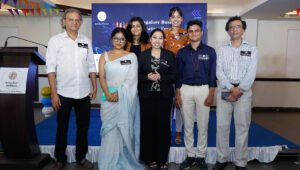
P.S. Narayan is instrumental in the creation of Wipro’s sustainability initiative and has stewarded it since its inception in early 2008. Under his stewardship, Wipro has been a threetime member of the Dow Jones Sustainability Index, a member of the CDP Global 500 Carbon Disclosure Leadership Index and ranked No: 2 in Newsweek’s global green rankings for 2012, Wipro has been widely considered a sustainability leader under his stewardship.
A graduate in Electrical Engineering with a postgraduation in Management, Narayan has nearly twenty years of cross-disciplinary experience in consulting, business development, design and implementation of Enterprise IT systems and most recently, in Corporate Sustainability. In addition, Narayan is a guest faculty at the Azim Premji University where he teaches ‘Ecology and Development’ as part of the Masters in Development course. Narayan has a deep interest in sustainable development, driven by the belief that the purpose of business must resonate and align with larger social and ecological goals.
What is ‘Sustainability’ according to you?
There really cannot be one definition of sustainability, as it has multiple social, ecological, economic and cultural dimensions to it. Depending on the differing contexts of geography, geopolitics and socio-economic domain, the emphasis and pitch of sustainability can vary. With that caveat, let me attempt what it could mean for the business sector – in simple terms, sustainability for a business entity would mean minimizing its negative impacts and maximizing its positive impacts ecologically, socially and economically. While that sounds simple enough, it becomes tricky when attempting to do these together. For example, maximizing positive outcomes economically very often also increases negative impacts socially or ecologically or both. Trying to resolve this conundrum is what constitutes the primary challenge for the business sector today.
How is it different from’re-engineering’ – a popular topic ten years ago.
There is really no direct connect between the two. While re-engineering is all about rendering business processes much more efficient by minimizing wasteful procedures and work steps, sustainability is about doing all the right things for all the stakeholders of business – in other words, doing the right things for the society and the planet. Re-engineering was primarily a business centric approach that focused on cost savings and therefore, eventually, better returns to shareholders. Sustainability cannot be confined within the boundaries of the organization and must go beyond the shareholder. The only possible commonality is that when seen in a narrow sense, one of the objectives of sustainability is centered around resource efficiency. But the methods of increasing and maximizing resource efficiency are quite different from that of reengineering.
Most people relate Sustainability to energy saving such as green building, smart building etc. How is it beyond that?
In the business context, the understanding of sustainability is broadly equated with the triple bottom line or the triple P – People, Planet, and Profits. When one examines a sustainability framework like the GRI (Global Reporting Initiative), one realizes the vast ground that sustainability covers. The GRI framework includes more than 100 parameters of which energy efficiency is only one. Some of the more common dimensions of sustainability – apart from Energy – are Water efficiency, Waste Management, Biodiversity, Product Stewardship, Supplier Responsibility, Labor Rights, Human Rights, Diversity, Health & Safety, Public Policy etc.
At Wipro, we think of sustainability in terms of the metaphor of the Mobius Strip – a geometrical shape that can be described as a twisted ring. We use this metaphor because sustainability issues are similarly intertwined i.e. ecological issues are also social issues and invariably have associated economic outcomes.
Why is it imperative for companies now to adopt Sustainability as a strategy?
There are at least three good reasons for companies to adopt sustainability. First – resource efficiency improvements can have a solid and tangible impact on the bottom line, something which is easy for business to understand. Second – the principle of stakeholder stewardship leads the company to do a lot more in areas which important but underinvested in e.g. employee health and safety or engaging with one’s proximate communities. These slowly but surely leads to happier stakeholders and therefore strengthen the company’s societal license to operate. Third – today, sustainability is increasingly being viewed as a proxy for a company’s sound governance systems and long term stability. There is thus an increasingly strong brand and reputation salience that a company can hope to reap from sustainability. Finally, what must be understood is that a company that doesn’t tread the sustainability path is setting itself up to face serious challenges to its very business continuity or survival in the long term.
How relevant is it for SMEs? Does it involve a lot of investment initially making it difficult for them to adopt?
SMEs must adopt sustainability for the same reasons that big companies are doing so – to reap cost and profitability benefits from resource efficiency, productivity gains from a healthier and accident free workplace and increasingly, the need to fulfill their customer’s requirements of them to act sustainably and responsibly. Not all sustainability initiatives require big investments and some of them that may require so have proven payoffs e.g. investments in more energy efficient equipment. What SMEs must do therefore is to start with a small set of carefully identified initiatives where the returns are almost guaranteed and which can be crucial differentiators for the company. This can then be expanded step by step to larger sustainability initiatives.
What is Sustainability Reporting? What are its benefits?
Just as the financial report is an articulation of a company’s financial health at a given point of time as well as its strategy, management practices and future plans, a sustainability report is a reflection of a company’s vision, goals and progress on sustainability. Sustainability reporting is also known as the triple bottom line reporting as it requires companies to disclose on the economic, social and ecological dimensions. First articulated by John Elkington, there are different frameworks today that can be used by companies for sustainability reporting, of which the GRI (Global Reporting Initiative) is the most common one, being used by nearly 400 of the Fortune 500 companies. Sustainability reporting is different from financial reporting in some key ways – one, it is addressed at multiple stakeholders and not just the investor and second, a good report is expected to present a balanced picture of what the company is doing i.e. the positives, the negatives and what the company is not doing.
The benefits of sustainability reporting are: (i) Disclosures act as catalysts for continuous improvement within the organization by bringing in rigor and transparency in the way critical issues are measured and reported (ii) Public disclosures help one benchmark, compare and set high standards for oneself (iii) A good sustainability report can help enhance the company’s brand equity with all stakeholders and society at large by showing it up to be a company that has the long term vision and perspective to be able to think, act, measure and then write about all these critical issues.
Can Sustainability become a career option for students?
Since sustainability covers vast terrain, it is possible for students to pick areas relevant to their interests and strengths. For example, the more technicallyminded can choose careers in energy engineering, clean energy technologies etc while those with a strong social conscience can choose to work in CSR or specific sectors like education. Sustainability calls for integrative thinking as it spans multiple disciplines across natural sciences, social sciences and their applications. Those who are comfortable with ambiguity and who like life-long learning that involves constantly revising one’s understanding will enjoy sustainability careers.











Recent Comments